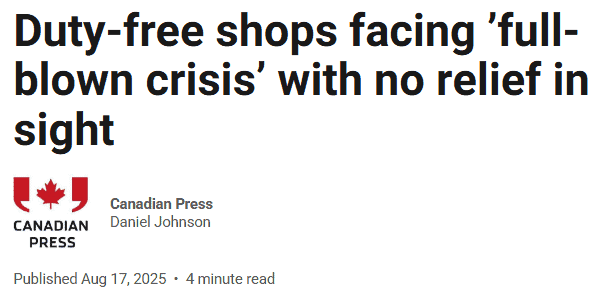Discover how a Canadian family achieved 239% returns using strategic...
Read MoreGTA Lawyer Accused in $3M Real Estate Fraud; Trust Funds Missing

In a stark sign of how the business environment has shifted post-pandemic, John Slipp, a 59-year-old operator of Woodstock Duty Free Shop Inc., announced the closure of his family-run store this month. The shop, located at the Woodstock border crossing in Ontario, had been in operation for over 40 years—originally established by Slipp’s father.
Slipp described the closure not only as a business failure but as a deeply personal loss. “I’m grieving the loss of my business, but also accepting the reality that the business environment has changed,” he said.
At its peak in the early 2000s, the store had 15 employees. By 2020, it was down to two. While Slipp hoped for a rebound, 2024 brought more setbacks—including declining traffic driven by renewed political tensions between Canada and the U.S.
Since Donald Trump’s return to the White House in early 2025, Canadian visits to the U.S. have continued to slide. Fear of cross-border harassment, trade uncertainty, and economic fallout have all weighed on travel. According to Statistics Canada, July 2025 marked the seventh consecutive month of year-over-year declines in return trips by car—down 36.9%.
The Frontier Duty Free Association described the situation as a “full-blown crisis,” with national duty-free sales dropping 40–50% since January and remote crossings seeing declines of up to 80%.

Barbara Barrett, Executive Director of the association, added: “This should be our busy season during the summer. Instead, we’re seeing pandemic-level traffic.”
Unlike airport duty-free shops—often run by large global operators—land border stores are typically family-owned. Many are now pushing for government support, including tax exemptions, rent deferrals, and tariff relief.
Slipp is advocating for loan programs and policy changes to help remaining stores survive. “There’s nothing in the bag of tricks that suggests this will improve soon,” he said.
AiF Insight
Even legacy businesses can vanish overnight in today’s economic climate. Once considered safe, the duty-free sector now reminds us that no industry is immune to systemic shifts. Investors and entrepreneurs alike must reassess long-term risks and stay agile in response to changing global conditions.
You may also interested in
Canadian Soldier Achieves 204% ROI with Investment Loan and Segregated Fund| AiF Clients
Zack, a Canadian soldier in his 40s, turned limited savings...
Read MoreFrom $100K to $520K: How a Millennial Actuary Couple Achieved a 154% Leveraged Return| AiF Clients
Discover how a millennial actuary couple used investment loans and...
Read MoreCan Non-Residents Invest in Segregated Funds in Canada?Hazel’s Journey with Ai Financial| AiF Clients
Hazel, a non-resident mother in Canada, invested CAD $200,000 across...
Read MoreFrom Anxiety to Empowerment: How a Mom of 3 Gained $67K in 20 Months | AiF Clients
Zara, a working mom of three, turned $200K into $259K...
Read More




